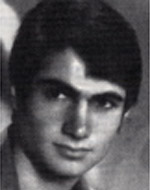Merkado, Itzik (Yitzhak)
Son of Susan and Albert,he was born on April 25, 1954, in Jaffa. Yitzhak, or Itzik, as his many friends called him, studied at the Weizmann and Shivtei Yisrael elementary schools in Jaffa and continued to study mechanical frameworks at the Shevach and ORT schools in Tel Aviv. Prior to his induction, Itzik worked for Israel Aircraft Industries. Yitzhak was drafted into the IDF at the beginning of May 1972. After completing basic training and finishing with a commanding officer course, he remained at the training base for recruits as a squad commander. He had successfully completed a physical training course and had been recommended by his commanders for an officer’s course. “The soldier has outstanding leadership ability, knows how to command soldiers, is very disciplined and reliable.” Yitzhak participated in the Yom Kippur War and received the medal of battle. The release certificate described his behavior as very good, and his commanders’ assessment was that he was a devoted, reliable and responsible soldier. At the beginning of May 1975, First Sergeant Yitzhak was discharged from the regular service, married and returned to work at Israel Aircraft Industries. The couple settled in Rishon Letzion and after a while they had a son. In the reserve service, Yitzhak was stationed in an infantry unit, although he could have been released from this framework for health reasons. His friends in the battalion said that “Itzik took care of everyone and listened to every problem, loved his friends and most of all loved his family.” When Operation Peace for the Galilee began, the longed-for order arrived. Itzik moved in with his battalion to Lebanon. On 1 Av, 21 July 1982, First Sergeant Yitzhak fell in combat in Lebanon during Operation Peace for the Galilee and was brought to eternal rest in the military cemetery in Holon, leaving a wife and son, parents and brother. His commander wrote, among other things, that “ever since Yitzhak came to the battalion he had acquired the reputation of a capable commander and a courageous fighter … He was the life of the company. His status in the company and his personal connections with his comrades in the battalion … were perhaps the reason why he continued to serve in the battalion despite the medical restrictions he suffered for a long time.”
